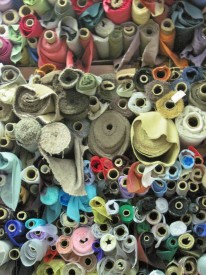
[soundslide url=”https://smcsites.com/soundslides/uploads/su1014_southphiladelphia_finalenterprise_fabricrow_soundslide” height=550 width=600]
If you’ve ever walked into one of the many fabric stores on Fourth Street in South Philadelphia without any knowledge of fabric, it can be a bit overwhelming. Hundreds of different spools of fabric line the walls and, in some stores, spill over into isles creating colorful narrow pathways.
Fabric Row, located along Fourth between South and Catherine streets, has been a marketplace for quality fabrics in Philadelphia for over a century. During the early 20th century, immigrants, skilled as tailors or seamstresses, made their living by working in stores or renting pushcarts. Today, restaurants, hair salons and even small grocery stores are sandwiched between second-, third- and fourth-generation fabric businesses.
On the 700 block of South Fourth street, two different fabric stores both operating for over ninety years share a similar history but perhaps a different future.

One of the oldest fabric businesses on South Fourth street is Paul’s. Russian Immigrants, Samuel and Esther Paul, opened their business in 1919. “When my father started working on Fourth street, they had a pushcart outside of this store,” said Harold Paul, the current owner of Paul’s. In the 1920s, City Hall issued pushcart licenses for $5, but some pushcart merchants purchased the right to set up shop from a store owner. The Paul’s paid $3 for rent each month and they worked both day and night. “At night, my parents made curtains so they could sell them the next day. Rain, snow or sleet never stopped them from working,” recalled Paul.
The hardworking gene was passed along to Paul. As a child, Paul remembers always being apart of the business. “When I was 8 years old, I started helping in the store. My father taught me at 10 how to use a sewing machine,” said Paul. In addition to selling fabric for window treatments, Paul’s is one of a few stores that make custom designs on the premises. “We still have people come in looking for custom drapes to be made, but over the last few years I’ve had problems finding people who are trained proficiently,” said Paul. When asked about the future of his business, Paul offered a bleak reply. “I don’t care what happens to this business. My only living son is a lawyer and he won’t be taking it over,” said Paul.
On the opposite side of the street, Maxie’s Daughter is a family business that spans four generations. Originally located on Ninth street in the Italian Market, the business was first called Max Wilk Fabrics. “My grandfather Max, a Russian immigrant, came over here when he was 16 or 17 years old. The government had taken everything from his family and they moved here to start a better life,” said Eric Trobman, son of the owner of Maxie’s Daughter.

Max Wilk’s better life began much like Samuel Paul’s. Wilk started work in the fabric business by renting a pushcart. “He began with taking basically scrap fabric, folding it neatly and turning it into something that would get people’s attention,” said Trobman. Wilk was eventually to make a sufficient living for his family and began renting a store in the Italian Market in the late 1930s. “My grandfather paid rent for his store for 75 years. He could have bought that building ten times over, but he was always scared,” recalled Paul.
In 1991, Wilk died and the future of the business was uncertain. The family turned to Beverly Trobman, Wilk’s daughter, to take over the business. “I was living in Florida and received a phone call from my brother, who already owns a fabric store, asking me to take over the business,” said Beverly Trobman, owner of Maxie’s Daughter. In 1994, Max Wilk Fabrics was moved to Fabric Row street and renamed as Maxie’s Daughter. “When we first moved here, we had more business than ever but the competition was more than we expected,” said Eric Trobman.

“At first, I made a lot of mistakes with the competition. I was buying fabric I had no right buying—like old patterns or whatever the neighbors were selling,” said Trobman. What has kept the business successful is its large supply of a variety of fabrics. “We offer selected fabrics of all types. We have dress, drapery, upholstery and wedding fabrics,” said Trobman. The future of Maxie’s Daughter is clear. For now, Beverly Trobman owns the business and her son, Eric, will take over in the future.“After me, I hope my son or one of my daughters will take over. We have enough fabric here for their grandchildren to sell,” said Trobman.
Paul and Trobman not only have a shared history, they also have a shared sentiment about the success of their family’s businesses. “Being honest, not making promises that I can’t keep,” said Paul. Trobman has learned the benefits of being yourself and offers advice to others, “Do what you do and do it well.”


Aw, this was an extremely great submit. Throughout notion I’d like to write down such as this moreover – using occasion and also genuine energy to manufacture a great article¡ nevertheless so what can I say¡ My spouse and i delay doing things a large amount along with never ever often acquire anything done.